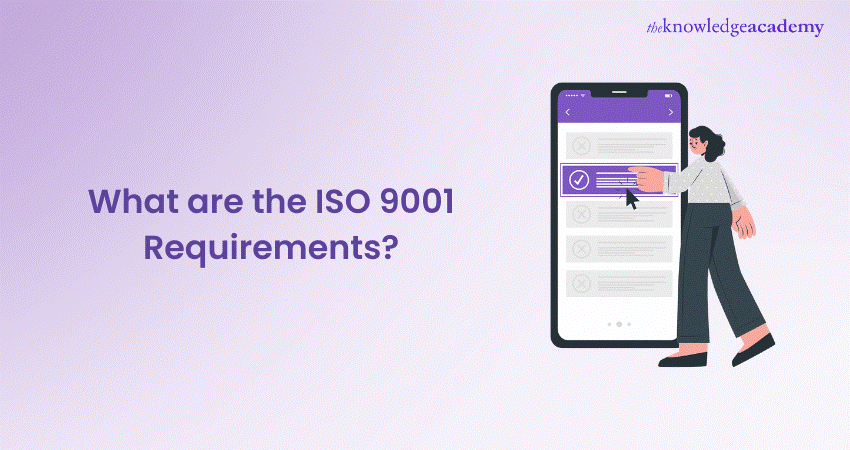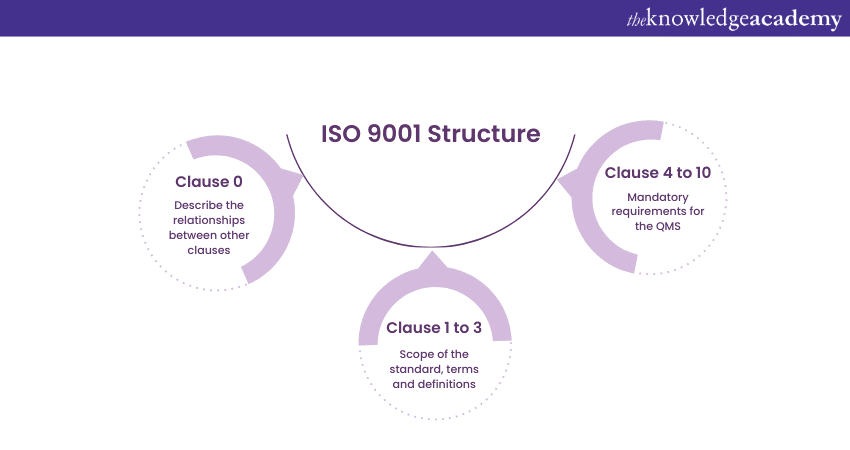We may not have the course you’re looking for. If you enquire or give us a call on 01344203999 and speak to our training experts, we may still be able to help with your training requirements.
Training Outcomes Within Your Budget!
We ensure quality, budget-alignment, and timely delivery by our expert instructors.

ISO 9001 is an international standard that sets criteria for the process of auditing an organisation's Quality Management System (QMS). They are verified to ensure they meet the ISO 9001 Requirements prescribed by the International Organization for Standardization (ISO). Various documents are typically required to demonstrate compliance with the standard.
This is one of the most popular standards which addresses the different facets of quality However, embarking on the path to ISO 9001 Certification requires a comprehensive understanding of its Requirements, intricacies, and implications.
So, let us go through this blog to explore the essential ISO 9001 Requirements. After reading this blog, you can unravel its intricacies and navigate the path to quality excellence.
Table of Contents
1) What are the Requirements for ISO 9001?
2) Structure of ISO 9001
a) Clause 0: Introduction
b) Clause 1: Scope
c) Clause 2: References
d) Clause 3: Terms and definitions
e) Clause 4: Context of the organisation
f) Clause 5: Leadership and commitment
g) Clause 6: Planning for the QMS
h) Clause 7: Support and resource management
i) Clause 8: Operational planning and control
j) Clause 9: Performance evaluation
k) Clause 10: Improvement actions
3) Conclusion
What are the Requirements for ISO 9001?
The ISO Requirements are established in ten clauses that include both mandatory and non-mandatory Requirements. As the term implies, mandatory Requirements must be met to be certified compliant with the ISO 9001 Standard. The Requirements help in ensuring the successful performance of the QMS within an organisation.
An example of a mandatory Requirement is a document outlining the features of the products produced or services provided. These types of ISO 9001 Documentation are essential for the process of creating a QMS to the ISO 9001 Standard. Non-mandatory Requirements contain documents which may or may not be required based on the type or size of the organisation.
The first three clauses under ISO 9001 Requirements cover the scope, references and terms of the ISO 9001 Standard. Although these clauses do not include mandatory Requirements, they deliver useful information to the organisation. Clauses four to 10 cover seven scopes of the organisation and contain the mandatory Requirements and actions for the standard.

Structure of ISO 9001
ISO 9001 Standard is an international QMS standard. It provides a set of Requirements and frameworks for organisations to meet customer expectations and continually improve their quality management processes. The structure of ISO 9001 is categorised into clauses as follows:

Clause 0: Introduction
People often overlook Clause 0, but you must focus on it, as it helps you understand the other clauses of ISO 9001. Clause 0 guides you in relating the clauses to each other and enables you to understand their details.
Under Clause 0, you can learn about the Quality Management along with ISO 9001 principles, the advantages of QMS implementation and the Plan-Do-Check-Act (PDCA) cycle. Learning these ISO 9001 Requirements can help organisations improve their services to keep customers satisfied.
Clause 1: Scope
This clause describes the objectives in general but without mentioning any obligatory Requirements. It explains a Quality Management System's fundamental goals, such as providing a reliable and a high-quality service to improve the client's experience. Furthermore, it clarifies the essential terminology, concepts, and phrases used in the ISO 9001 Standard.
Clause 2: References
The terms and references used throughout ISO 9001 are defined in this section. By understanding these references, organisations can access valuable resources that enhance their Requirements and facilitate compliance with the standard.
Clause 3: Terms and definitions
This clause explains the essential terminology, concepts, and phrases used in the ISO 9001 Standard. Moreover, it ensures mutual understanding among stakeholders involved in the implementation and maintenance of the QMS by providing consistent definitions.
Clause 4: Context of the organisation
An organisation cannot make decisions independently as they are closely connected to the customer's needs and expectations. Thus, this section addresses internal and external factors that may affect how an organisation sets and achieves its goals.
It also defines regulations for the interested parties that engage with the QMS. Additionally, it contains the specific Requirements for the process mapping and characterisation and the QMS's overall scope.
Clause 5: Leadership and commitment
This section on Leadership and Commitment explains the Requirements of top management. These include the following:
a) Fostering an organisation-wide customer focus
b) Creating and upholding a quality policy that sets direction and alignment
c) identifying responsibilities and authorities across the QMS to clarify who has decision-making authority and what is expected of each function operating within the system.
Do you wish to unlock your organisation's potential? Grab the chance with ISO 9001 Course - register now!
Clause 6: Planning for the QMS
The Requirements for identifying and managing risks and opportunities are presented in this section. In addition, it assists in creating quality goals that are consistent with the quality policy. This clause underscores the importance of systematic planning as a precursor to successful QMS implementation and operation.
Clause 7: Support and resource management
Clause 7 addresses the provision of resources necessary for the establishment, implementation, maintenance, and continual improvement of the QMS. It encompasses various aspects, including human resources, infrastructure, work environment, and organisational knowledge.
By ensuring that adequate resources are available and properly managed, organisations can support the effective operation of the QMS. This clause also emphasises the importance of resource allocation and management as integral components of QMS implementation.
Clause 8: Operational planning and control
Only this section allows a business to opt out of some criteria (such as excluding the design Requirements). These are concerned with planning for a product (or service) and involve figuring out and reviewing what is needed for the product. It also aids in designing and development of the same to enhance its purchase, manufacturing and supply. The final Requirements cover quality assurance and non-conformities in goods and services.
Clause 9: Performance evaluation
This section outlines the ISO Quality Standards for measuring customer satisfaction, internal audit, monitoring, analysis, and process performance as outlined in this section, align with the ISO 9001 Audit Checklist. The prerequisites for the management review, such as the inputs and outputs, are also mentioned.
Clause 10: Improvement actions
The last component covers remedial measures and ongoing improvement for your QMS. It is essential to note that these ISO 9001 Requirements are common in nature and can be modified per the organisation's specific needs. The organisation must interpret and apply them to align with its context and objectives. Organisations seeking ISO 9001 certification must also comply with the certification body's Requirements.
Want to become an expert in Internal Auditing? Join ISO 9001 Internal Auditor Training now!
Conclusion
After reading this blog on ISO 9001 Requirements and structure, we hope you know the documents and paperwork required to obtain this certification. Organisations should ensure that their documentation is implemented and maintained to meet their specific demands.
Establish robust QMS with our comprehensive ISO 9001 Certification today and enhance your existing product lineup!
Frequently Asked Questions

The seven crucial principles of ISO 9001 guide organisations to maintain of effective quality management systems. Those principles include engagement of people, customer focus, leadership, process approach, continual improvement, factual approach to decision-making and relationship management.

While ISO Certification can offer advantages to various industries, certain sectors particularly reap substantial benefits from obtaining ISO Certification. These sectors encompass construction management, Information Technology (IT), hospitality, healthcare, manufacturing, engineering firms, and community services.

The Knowledge Academy takes global learning to new heights, offering over 30,000 online courses across 490+ locations in 220 countries. This expansive reach ensures accessibility and convenience for learners worldwide.
Alongside our diverse Online Course Catalogue, encompassing 17 major categories, we go the extra mile by providing a plethora of free educational Online Resources like News updates, Blogs, videos, webinars, and interview questions. Tailoring learning experiences further, professionals can maximise value with customisable Course Bundles of TKA.

The Knowledge Academy’s Knowledge Pass, a prepaid voucher, adds another layer of flexibility, allowing course bookings over a 12-month period. Join us on a journey where education knows no bounds.

The Knowledge Academy offers various ISO 9001 Certifications, including the ISO 9001 Foundation Course, ISO 9001 Lead Auditor Course, and ISO 9001 Internal Auditor Training. These courses cater to different skill levels, providing comprehensive insights into the ISO 9001 Internal Audit and Checklist.
Our Business Improvement Blogs cover a range of topics related to ISO 9001 Requirements, offering valuable resources, best practices, and industry insights. Whether you are a beginner or looking to advance your Business skills, The Knowledge Academy's diverse courses and informative blogs have got you covered.
Upcoming Business Improvement Resources Batches & Dates
Date
 ISO 9001 Lead Auditor Course
ISO 9001 Lead Auditor Course
Mon 19th Aug 2024
Mon 16th Sep 2024
Mon 14th Oct 2024
Mon 11th Nov 2024
Mon 16th Dec 2024
Mon 6th Jan 2025
Mon 3rd Feb 2025
Mon 3rd Mar 2025
Mon 7th Apr 2025
Mon 12th May 2025
Mon 2nd Jun 2025
Mon 7th Jul 2025
Mon 4th Aug 2025
Mon 1st Sep 2025
Mon 20th Oct 2025
Mon 3rd Nov 2025
Mon 1st Dec 2025







 Top Rated Course
Top Rated Course


 If you wish to make any changes to your course, please
If you wish to make any changes to your course, please


